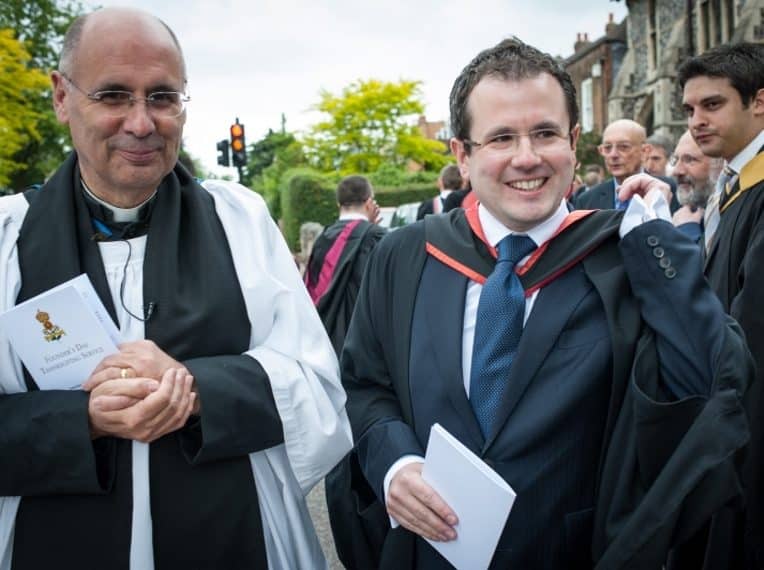
I write this having recently bidden farewell to our Year 13 leavers and having also enjoyed meeting many Old Elizabethans at the 2012 Founder’s Day Fete organised by the Friends of Queen Elizabeth’s.
More than ever, I am sensible of the great contribution made to the wellbeing of the School by the wider Elizabethan community, including alumni of all generations, parents and other supporters.
Founder’s Day amply demonstrates that contribution. This year, our guest speaker at the service, Piers Martin, Director and CEO of British Fencing, gave an illuminating address in which he discussed the British Olympic fencing team and the steadfast dedication necessary to succeed at Olympic level. Piers was a QE pupil from 1987 to 1994, while his father, Barrie Martin, is Chairman of the Governing Body. On a personal note, I enjoyed my first opportunity as Headmaster to preside over the traditional Roll Call and give the reading of the School Chronicle on Stapylton Field. We were also pleased to be able to revive an old QE tradition – the playing of a Founder’s Day cricket match between the School First XI and an old boys’ team.
Other highlights of the term have included a number of events through which the School celebrated the Queen’s Diamond Jubilee. Our Kings and Queens Concert was a memorable success, as was the special Jubilee-themed lunch in a bunting-decked Refectory. It was good to welcome back QE old boy Claude Francois Muhuza (2001-2008) as guest speaker at Junior Awards.
I have also been encouraged recently by the early success of the Old Elizabethans Business Club, which is very ably led by Michael Galluci (OE 1981-88). Launched in January last year on the LinkedIn social media platform, the club has attracted a good number of members. Its aims include providing opportunities for old boys across the world to get to know each other, share business advice and news, to get together at various functions and to support the School.
Earlier this term, I relished the opportunity to meet some older alumni when I attended the popular Forty Society Luncheon Club, which, as most of you will doubtless know, is for those who left the School 40 or more years ago. Included in the society’s ranks are a number of Old Elizabethans who took part in one of the more remarkable events in the School’s history which took place 50 years ago this summer: the 1962 QE expedition to the Soviet Union and Eastern Europe.
Such links with our past are tremendously important, as are the regular visits to the School by our old boys. We see our alumni as a significant element in the future development of Queen Elizabeth’s School. This is set out in our four-year plan, entitled School Priorities for Development 2012-2016, which has just been fully endorsed by the School’s Governing Body.
We are, of course, looking forward to the Olympics. Tom Aggar (OE 1995-2002), has become quite a familiar face at QE and I will be cheering him on in the rowing as he aims to repeat his gold-winning performance of the Beijing Paralympics. I will also watch with keen interest the performance of Piers Martin’s fencers.
Finally, I am delighted to be able to bring you positive news regarding our buildings. Firstly, the new Food Technology suite is now complete and is currently being tested before we bring it into full use in September this year. Secondly, the Trustees recently gave their formal assent to the next phase, which will involve the creation of our new Library and Dining Hall. Work began recently and the new facilities are scheduled to be ready for use in September 2013.
May I wish you all an enjoyable summer.
Neil Enright

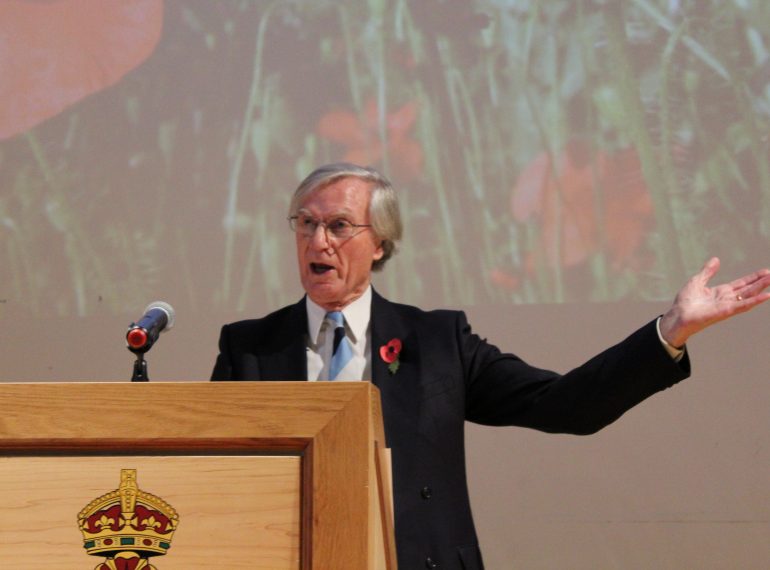
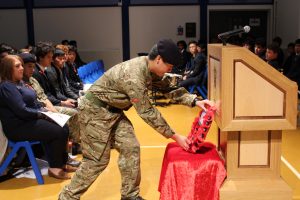 All boys from Years 7–10, together with staff and many senior pupils, took part in the ceremony, which featured music, poetry and a procession by the Combined Cadet Force.
All boys from Years 7–10, together with staff and many senior pupils, took part in the ceremony, which featured music, poetry and a procession by the Combined Cadet Force.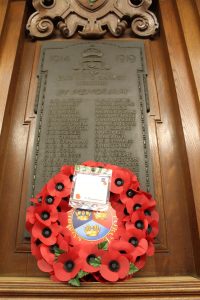 erritorial gains for either side.
erritorial gains for either side.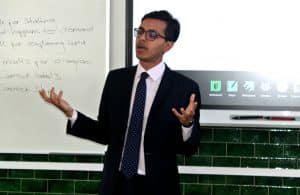 Alumni continue to support QE by giving careers talks. This term’s included a lunchtime lecture by Samir Manek (OE 2001–2008), a litigator working at the heart of the UK’s financial regulatory system as an Associate (Solicitor) with the Financial Conduct Authority. He urged on QE’s aspiring lawyers the importance of a genuine passion for the Law.
Alumni continue to support QE by giving careers talks. This term’s included a lunchtime lecture by Samir Manek (OE 2001–2008), a litigator working at the heart of the UK’s financial regulatory system as an Associate (Solicitor) with the Financial Conduct Authority. He urged on QE’s aspiring lawyers the importance of a genuine passion for the Law.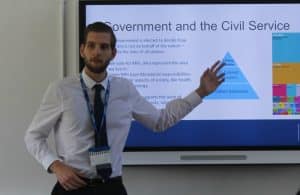 And Civil Service economist Andrei Sandu (OE 2007-2014) told senior boys that he was already advising a Government Minister at a European summit, just a few short months after starting his job. Andrei joined the Department for Business, Energy and Industrial Strategy (BEIS) as part of the economists’ group of the Civil Service Fast Stream in August last year. In the autumn of 2017, he was called upon to attend a Council of Ministers summit in Brussels, where he advised Lord Henley, of BEIS, throughout the session.
And Civil Service economist Andrei Sandu (OE 2007-2014) told senior boys that he was already advising a Government Minister at a European summit, just a few short months after starting his job. Andrei joined the Department for Business, Energy and Industrial Strategy (BEIS) as part of the economists’ group of the Civil Service Fast Stream in August last year. In the autumn of 2017, he was called upon to attend a Council of Ministers summit in Brussels, where he advised Lord Henley, of BEIS, throughout the session.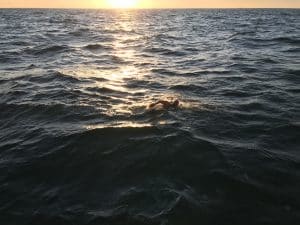 Piers Martin was part of a relay team that successfully swam the English Channel in rough conditions and raised more than £6,000 for Autism East Midlands. Yet, even though the team were eminently suited to the challenge – Piers (OE 1987–1994) is a high-performance sport and business consultant and a former national-level swimming champion, while two of his fellow team-members are water polo coaches – the swim almost didn’t happen. Because of worsening weather, the authorising organisation, the Channel Swimming and Piloting Association (CSPA) had called off the swim, only to give the team an eleventh-hour reprieve after they had already left Dover and were heading home.
Piers Martin was part of a relay team that successfully swam the English Channel in rough conditions and raised more than £6,000 for Autism East Midlands. Yet, even though the team were eminently suited to the challenge – Piers (OE 1987–1994) is a high-performance sport and business consultant and a former national-level swimming champion, while two of his fellow team-members are water polo coaches – the swim almost didn’t happen. Because of worsening weather, the authorising organisation, the Channel Swimming and Piloting Association (CSPA) had called off the swim, only to give the team an eleventh-hour reprieve after they had already left Dover and were heading home.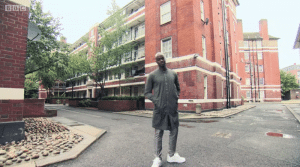 George the Poet (George Mpanga, OE 2002–2009) has raised his already-high profile still further by appearing on TV screens in both the public and private spheres. A keen advocate of social justice, George investigated how and why the capital’s poor residents are losing out as council homes disappear for an Inside Out London current affairs programme on BBC1. He also starred in a new commercial for O2 reflecting on the wonder of Planet Earth and the transitory nature of human life.
George the Poet (George Mpanga, OE 2002–2009) has raised his already-high profile still further by appearing on TV screens in both the public and private spheres. A keen advocate of social justice, George investigated how and why the capital’s poor residents are losing out as council homes disappear for an Inside Out London current affairs programme on BBC1. He also starred in a new commercial for O2 reflecting on the wonder of Planet Earth and the transitory nature of human life. Akshay Ruparelia’s fast-expanding online estate agency, Doorsteps.co.uk, launched a second crowdfunding round during the autumn – and smashed its £400,000 target within seconds of the offer going live. Akshay (OE 2009–2016) made national headlines last year after the first fundraising, with the young entrepreneur’s age attracting journalists’ admiration.
Akshay Ruparelia’s fast-expanding online estate agency, Doorsteps.co.uk, launched a second crowdfunding round during the autumn – and smashed its £400,000 target within seconds of the offer going live. Akshay (OE 2009–2016) made national headlines last year after the first fundraising, with the young entrepreneur’s age attracting journalists’ admiration.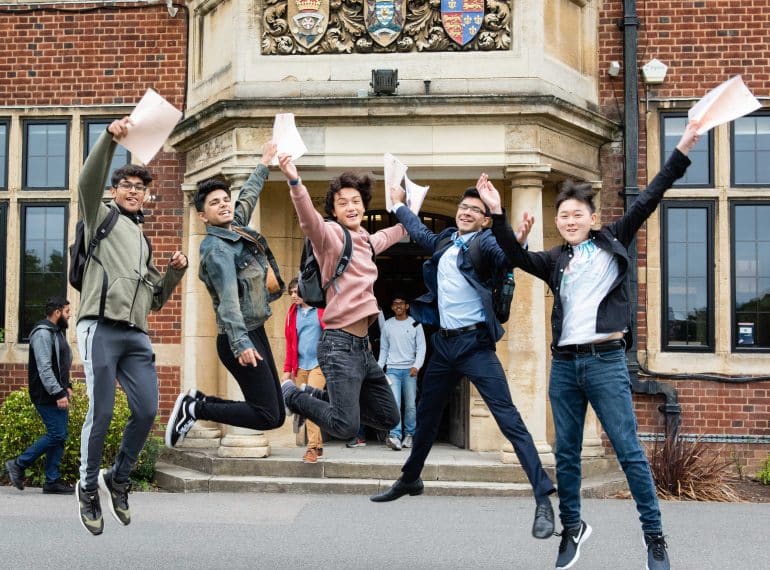
 New records were set in August, with the number of GCSE examinations awarded the A* grade hitting 78%. At A-level, we recorded our highest-ever total of A* grades, while 2018 was the 13th consecutive year in which the proportion of examinations awarded A*–B grades – a commonly used benchmark figure – has topped 95%.
New records were set in August, with the number of GCSE examinations awarded the A* grade hitting 78%. At A-level, we recorded our highest-ever total of A* grades, while 2018 was the 13th consecutive year in which the proportion of examinations awarded A*–B grades – a commonly used benchmark figure – has topped 95%.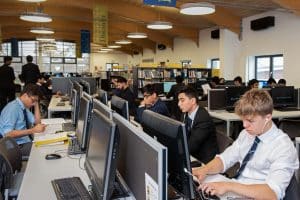 More recently still, QE was crowned the country’s top state school in the Sunday Times Parent Power survey, overtaking the 2017 winners, The Henrietta Barnett School, to head the table comprising the 150 leading state schools. This highly influential survey determines ranking based on the percentage of examination entries gaining A* to B grades at A-level (which is given double weighting) and the percentage of entries awarded A* and A grades at GCSE.
More recently still, QE was crowned the country’s top state school in the Sunday Times Parent Power survey, overtaking the 2017 winners, The Henrietta Barnett School, to head the table comprising the 150 leading state schools. This highly influential survey determines ranking based on the percentage of examination entries gaining A* to B grades at A-level (which is given double weighting) and the percentage of entries awarded A* and A grades at GCSE.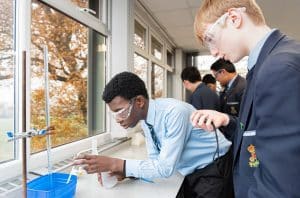 It is tremendously important that boys develop and maintain a broad outlook alongside their achievement of very strong academic results if they are to thrive. One foundation of such a holistic approach is that boys begin reflecting upon their own lives and attitudes as they start finding their place in the world. Two of our alumni, poet Anthony Anaxagorou (OE 1994–1999) and Bilal Harry Khan (OE 2003–2010, featured elsewhere in this newsletter) explored the sometimes-tricky areas of identity, masculinity and gender roles when they visited this term, with Bilal speaking to Year 11 and Anthony delivering a Sixth Form assembly. Alongside and related to these areas, we recognise the importance of boys looking outwards in their relationships, adopting habits of kindness, thoughtfulness and respect for others. By so doing, not only do boys establish better relationships, but they also stand to gain themselves.
It is tremendously important that boys develop and maintain a broad outlook alongside their achievement of very strong academic results if they are to thrive. One foundation of such a holistic approach is that boys begin reflecting upon their own lives and attitudes as they start finding their place in the world. Two of our alumni, poet Anthony Anaxagorou (OE 1994–1999) and Bilal Harry Khan (OE 2003–2010, featured elsewhere in this newsletter) explored the sometimes-tricky areas of identity, masculinity and gender roles when they visited this term, with Bilal speaking to Year 11 and Anthony delivering a Sixth Form assembly. Alongside and related to these areas, we recognise the importance of boys looking outwards in their relationships, adopting habits of kindness, thoughtfulness and respect for others. By so doing, not only do boys establish better relationships, but they also stand to gain themselves.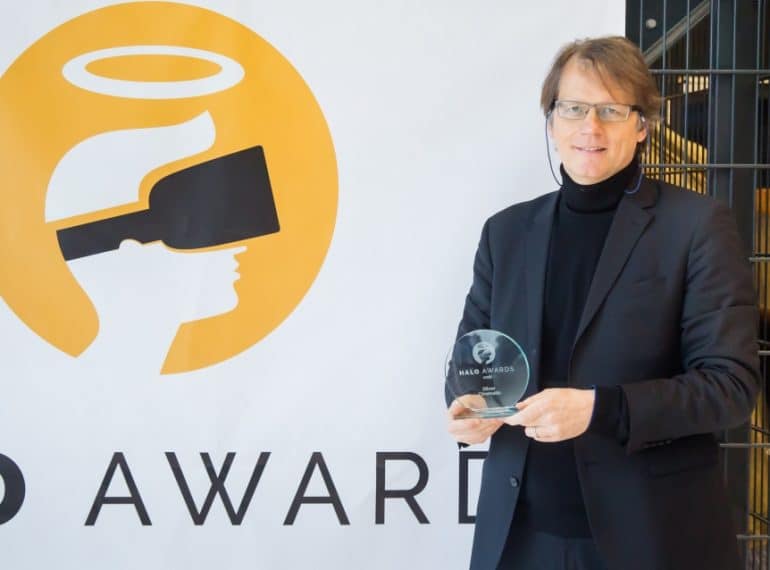
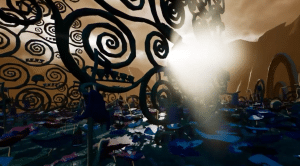 The experience, entitled Klimt’s Magic Garden, firstly won Fred a Silver Medal for Cinematic Virtual Reality at the European Virtual Reality Halo Awards in Amsterdam.
The experience, entitled Klimt’s Magic Garden, firstly won Fred a Silver Medal for Cinematic Virtual Reality at the European Virtual Reality Halo Awards in Amsterdam.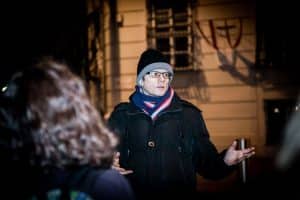 In Klimt’s Magic Garden, which is experienced using virtual reality headsets, everything the viewer sees originally comes from Klimt, yet it has all been given depth, movement, and natural-style lighting. The experience features a digital spatial narrative structure that reflects the themes of expectation and fulfilment Klimt explored in his work for the Stoclet Palace.
In Klimt’s Magic Garden, which is experienced using virtual reality headsets, everything the viewer sees originally comes from Klimt, yet it has all been given depth, movement, and natural-style lighting. The experience features a digital spatial narrative structure that reflects the themes of expectation and fulfilment Klimt explored in his work for the Stoclet Palace.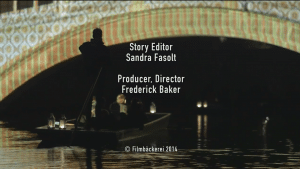 He returned to St John’s in 2014 to create a
He returned to St John’s in 2014 to create a 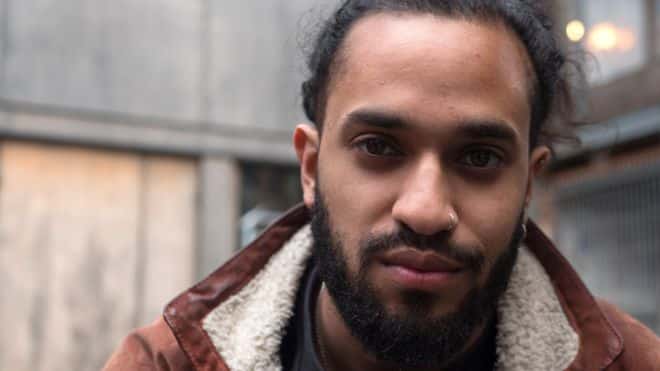
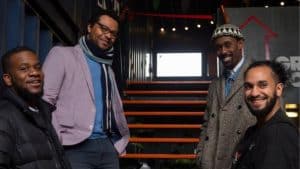 duates, all ‘black and mixed-race guys’, looking at life, diversity and the challenges faced after graduation. One recent episode of the podcast featured an interview with Stormzy, following the artist’s decision to sponsor scholarships at the university for black students.
duates, all ‘black and mixed-race guys’, looking at life, diversity and the challenges faced after graduation. One recent episode of the podcast featured an interview with Stormzy, following the artist’s decision to sponsor scholarships at the university for black students.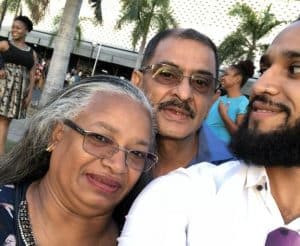 When used in the UK, the term ‘mixed-race’ is generally presumed to mean a combination of white and ‘something else’, he said, yet that did not describe him or many other people. “Perhaps we need to change the definition to include people like myself, like my mum,” he said.
When used in the UK, the term ‘mixed-race’ is generally presumed to mean a combination of white and ‘something else’, he said, yet that did not describe him or many other people. “Perhaps we need to change the definition to include people like myself, like my mum,” he said. identity and you. His own passion, Bilal told the boys, was for “social equality and change, youth empowerment, equal opportunity”.
identity and you. His own passion, Bilal told the boys, was for “social equality and change, youth empowerment, equal opportunity”.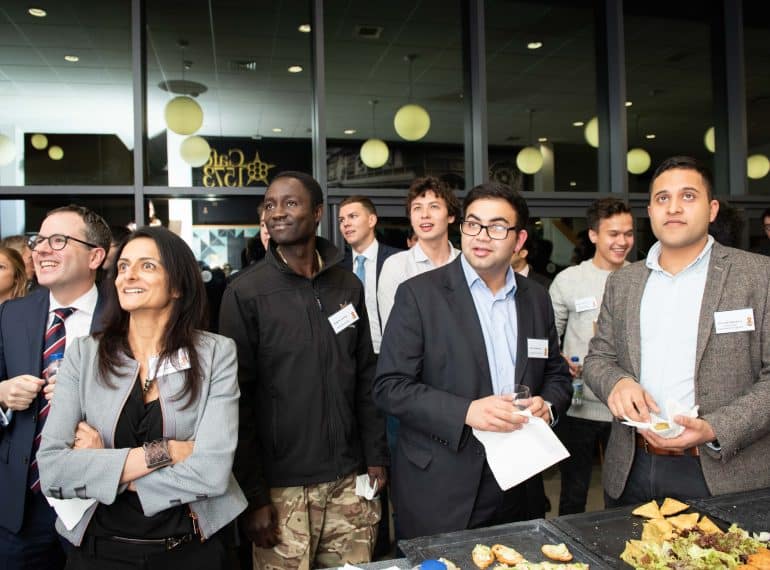
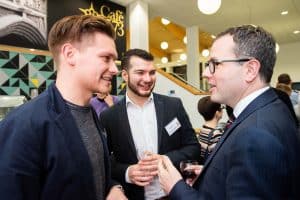 Volunteers gathered early for a reception and the chance to network in Café 1573. Later, there was a tremendous buzz on the convention floor as alumni shared their experiences and answered questions from Year 11 boys and their parents.
Volunteers gathered early for a reception and the chance to network in Café 1573. Later, there was a tremendous buzz on the convention floor as alumni shared their experiences and answered questions from Year 11 boys and their parents.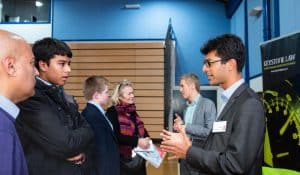 range of opportunities. It is always incredibly useful for the boys to be able to seek advice from those who have been at the School and who have had the experience of establishing themselves in their chosen fields.
range of opportunities. It is always incredibly useful for the boys to be able to seek advice from those who have been at the School and who have had the experience of establishing themselves in their chosen fields.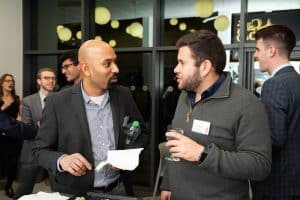 In addition to representatives of the major professions, those present at the convention included a good number who have forged a path in more unusual careers, such as:
In addition to representatives of the major professions, those present at the convention included a good number who have forged a path in more unusual careers, such as: